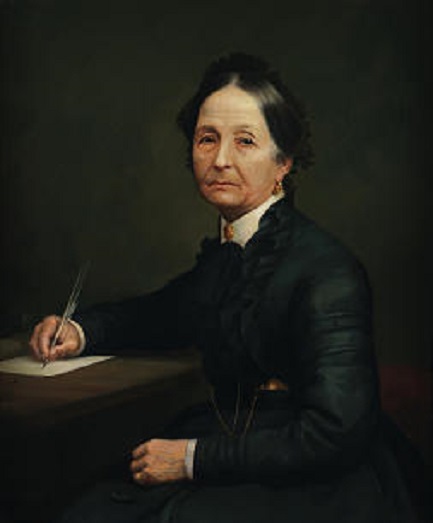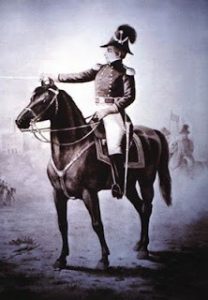
 THE FUNERAL OF LIEUTENANT GENERAL SMITH
THE FUNERAL OF LIEUTENANT GENERAL SMITH
By Miss Eliza R. Snow.
It was a Sabbath day.—The morning came,
But came not with the usual joyousness
With which the consecrated day was wont,
In Nauvoo City, ever and anon,
To usher its broad radiance on a train
Of humble, cheerful worshipers. Nature
Seem’d conscious of the mournful knell
That broke upon the sadden’d heart of man!
The sun arose, muffled with clouds that hid
His own bright beams, and in effusions soft
And gentle, as the soothing feeling tones
Of sorrow, dropt a sympathetic tear.
At length the clouds dispers’d—the sun pour’d Forth.
His glorious rays in bri’liant majesty;
And I beheld upon the beauteous plain
That fronts the noble Mississippi’s wave,
A mighty host—a pow’rful warrior band
Whose rich escutcheons glitter’d in the sun.
I heard the sound of martial music, but
It came with solemn, slow and mournfjul air,
Unlike the bold, and thrilling notes that call
The restless warrior to the battle field!
There was no clash of arms—no din of war—
The sword was sheath’d, and every martial Brow
Was mellow’d into sadness! Mounted high
Upon a fiery steed, a Chieftain sat
And issued the command; and then, anon,
In double file—in open columns form’d,
With Chieftains in the front—then horses and Foot,
In solemn order, mov’d across the wide
Extended plain, the Nauvoo Legion. ‘Twas
A splendid sight—a sight that would have Charm’d
The eye of each beholder; but alas!
That grand display, was the last honors paid
To the departed!
In the Legion’s rear,
Still lengthening out the vast procession;
Walk’d A crowd of citizens of every rank—
Of either sex; and last of all clos’d in
A long and glittering train of charriages.
I gaz’d upon the grand procession, till
It disappear’d amid the dwellings which
Stand thickly cluster’d near the river’s edge
I listen’d—all was still—the music notes
No longer sounded on the pensive breeze,
But hark! the notes awaken’d, and I saw
The mighty host returning with the same,
Slow, melancholy tread! A herse was borne
Along with solemn, yet bold martial pomp,
That plainly signified, a mighty one,
One of no ordinary rank, had fallen!
Near to the summit of an eminence
Rising in bold relief, to dignify,
The beauty of the verdant plain beneath;
In Nature’s temple, with no other wall,
Than the horizon; and no other arch,
Than the broad canopy of heaven; shaded
With clust’ring boughs, whose foliage waves around;
Is rais’d an altar to the living God.
There the procession march’d—it halted there;
And in the front of weeping relatives,
The herse of him was placed, who there, in life
Had been a fervent, constant worshipper!
His arms and armor, on his coffin lay
And other swords than his, lay crossed there.
His brother officers, who form’d with him,
The noblest Military Staff, our fair
Columbia has to boast, were seated by
In shining armor clad; but ah! they seem’d
Divested of the martial haughtiness—
That warlike pride that fires the warrior’s eye—
it lay conceal’d beneath the brow of grief.
The invocation and the sacred chant,
Open’d the solemn service of the day;
And then the man of God arose. In tones
Of truth’s impssion’d eloquence, he spoke
Of the late sad occurance, which had touch’d
The hears of all; and universally
Was calling forth, a “fellowship of grief”
Each soldier, mourn’d a general—each saint,
A brother—and each citizen, a friend!
But when he came to pain the glories of
The world to come; wrapt in the visions of
Eternal truth; e’en grief itself, bow’d down,
And the vast multitude, for once, forgot
To weep. And then, he sweetly dwelt upon
The character of the deceas’d, without
A stain—his Christian life, that seem’d without
A blemish—and his military course,
A path of honor. Tho’ he had not stood
Before the cannon’s mouth—altho’ he ne’er
Had been in battle, front amid the range
Of war, and clash of arms; and altho’ now,
H’d fall’n according to the common course
Of providence, and had not perish’d by
The sword; he was no less a patriot—
He lov’d his country—he’d prepar’d himself,
By stepping high, in military rank,
To do her service at her earliest call.
And then the chaplain spoke of him, in the
Retir’d relations of domestic life.
There sat his aged, widow’d mother, whom
He’d honor’d with most filial sanctity—
To whom, he’d been a constant solace in
Those scenes of persecution and distress.
Which she had suffer’d for the gospel’s sake.
While, as a brother, he had ever prov’d,
Firm as Giberalter’s rock—true unto death.
And then he came still nearer home, and touch’d
The finest fibre of the human heart;
And spoke of her, the lonely widow, of
The noble fallen chieftain—the befeft
Companion of his bosom, whom he’d lov’d
With faithful tenderness. Ah! who can now,
En’er the halo of her feelings—soothe her grief
For him who onlhy could reciprocate
Her bosom’s sympathies? He too, had been
A loving and indulgent father to
Her lonely, weeping babes—left fatherless!
To soothe the bleeding heart, the speaker then
Spoke of the blest reunion, that awaits
The faithful worshippers of the Most High.
Thus clos’d the man of God.—The service Done;
Again the great procession form’d, and once
Again, the bearers took the silent pall
And bore it onward to the “narrow house!”
Then came the parting scenery that clos’d
The service of the living to the dead.
Whether the olive branch—the cypress bough
Or myrtle wreath, it matters not, ‘twas given
As the last token of profound respect—
The Legion, one by one, depostited
Within the grave, a green unwither’d bough,
And passing onward left the trophied urn!
A voice was heard slowly pronouncing, “Earth
To earth—Ashes to ashes—Dust to dust,
Return this body to its mother earth;
While on the coffin, fell the parted clod
Beside the grave, the Legion’s playing band,
Awoke melodia’s sweetest strain. A chord
Was touch’d that echoed music to the springs
Of life, and fell as soft upon the ear,
As if seraphic harpers had come down
To charm the sleeper in his lowly rest.
The music ceas’d—Another chaplains voice
With heavenly eloquence pour’d forth in pray’r
To the Eternal God, responding pass’d
From heart to heart of the vast multitude—
The mourning concourse in the burial grove,
And there, beneath Time’s monument the Oak;
Whose umprage wav’d luxurious to the breeze,
They left the shouded buried corpse of one,
Belov’d in life and honor’d in his death;
Waiting the trump of God, to call it forth
To hail its own bright spirit from the skies!
City of Nauvoo Aug 12th 1841.

Obituary.
Died—In this city, on the 15th ultimo, Don Carlos infant son of Joseph and Emma Smith, aged 14 months and 2 days—Like the bud of a beautiful flower, ere it had time to expand it was cut down, but it rests in peace.
Both the brother, Don Carlos, and the baby son were buried in the cemetery not far from the Temple grounds in Nauvoo. The bodies from this cemetery were moved to other locations and bother of these bodies were moved to Emma’s garden where they are to this day.
